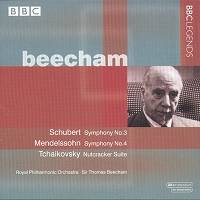
Trawling for treasure
BILL NEWMAN seeks out Golden Age performers now reinstated on CD
BBC Legends
BBC BBCL 4044-2
|

|
This invaluable series sells well, a fact not difficult to grasp from
the international roster of best-selling artists that underpinned the growing
reputations of major record companies from the 1930s onwards.
There is another meaning for concert and recital audiences of the older
generation fortunate enough to have attended the events themselves. They
can now relive the aura of select occasions recapturing the spontaneity
of superb musicians irradiating their performing art.
You may wonder how this provides for a younger generation of listeners
familiar with today's styles and attitudes. The message behind all
interpretation remains all-embracing, irrespective of time and place. Aware
of this, BBC Radio 3 featured excerpts from their archives with a 2.45 slot
on Sunday afternoons. Even so, quality of transmission did not always measure
up to the sound quality achieved by the Legends transfer team.
Beecham BBCL 4044-2
After the rousing National Anthem opening the Royal Festival Hall concert
on 15 October 1958, Beecham embarked on a reading of Schubert's Third
Symphony that only he could perpetuate with his customary penchant for charm,
grace and drama. Straightaway, one feels Schubert's love of
the theatre from the solemn opening measures, the sforzando downbeat setting
in motion curving string lines to explore different key textures, visionary
and remote for their period.
I love Sir Thomas's entry into the main subject: buoyant, yet sustained
with winds and strings alternating until a great crescendo turns opéra
bouffe repartee into stormy passion. The sudden modulation brings a
galaxy of woodwind delights against muted, pointed strings. Beecham makes
his audience aware that the composer's answering subjects require their
own distinctive approach.
The slow movement has effortless grace, so gentle in its seduction and
courtly in guise that one imagines two dancing figures lovingly expressing
endearments. Upper strings are held back for gorgeous wind solos, and just
before the end Jack Brymer's clarinet soars aloft leading the musical
thread back to the opening measures.
The Menuetto vivace and Trio resemble a game of contrasts,
the former rumbustuous with delicate asides, the middle part subtle, vaguely
suggestive with rhythmic pointillations lower down the register.
The Presto vivace Finale, however, finds our conductor in joyous
vein throughout, with a strong sense of devilry bringing added exuberance
to those key points where Schubert urges his forces in other directions.
The coda's imperious closing chords are a reminder of what would arrive
much later in the great C major Symphony.
I have never understood conductors who perform the first and fourth movements
of Mendelssohn's Italian Symphony at a breakneck speed and the
centre ones with meaningless, fleeting complacency. Allegro vivace,
Andante con moto, Con moto moderato and Saltarello -- Presto
should never become the excuse for obscuring the inner beauties of pleasurable
discoveries enhanced by the composer's for instrumental balances, blendings
and tonal contrasts.
Beecham presents the work as a composer looking ahead to Schumann and
Brahms. There is boldness in the opening movement that radiates confidence
and clarity at the same time, never sagging at the seams but suggestive
of constant momentum and pride in which wind players never struggle to articulate
their phrases. During the development -- always a fascinating aspect
of Mendelssohn's symphonic writing -- string sections can be heard
pirouetting counterpoint figures to and fro -- and the main theme's
return is truly resplendent.
Studies of contrast is how I would describe the second and third movements,
and that is exactly what we hear in this performance, the one tempered by
sadness and fond reflections, the other with sweetness and light. The lighter,
expressive scoring in each provides a feeling of space and transparency.
After a warm welcome to the joys and true meaning of Christmas complete,
with its usual excesses of food and drink, Sir Thomas wishes everyone a
happy New Year, signing off with a performance of Tchaikovsky's Nutcracker
Suite in a BBC Studios recording on 9 December 1958. Played straight,
each movement at the correct tempo, it is an absolute gem.
Slight hardness in the Royal Festival Hall acoustic, compared with more
immediate Studio sound, hardly detracts from the continuing wonder of great
musicmaking.
Continue >>
Copyright © 9 May 2001
Bill Newman, Edgware, UK
 CD INFORMATION - BBC LEGENDS BBCL 4044-2
PURCHASE THIS DISC FROM CROTCHET
PURCHASE THIS DISC FROM AMAZON
<< Music
& Vision home Recent reviews
William Boyce >>
Record Box is Music & Vision's regular Wednesday series
of shorter CD reviews
CD INFORMATION - BBC LEGENDS BBCL 4044-2
PURCHASE THIS DISC FROM CROTCHET
PURCHASE THIS DISC FROM AMAZON
<< Music
& Vision home Recent reviews
William Boyce >>
Record Box is Music & Vision's regular Wednesday series
of shorter CD reviews
| 
